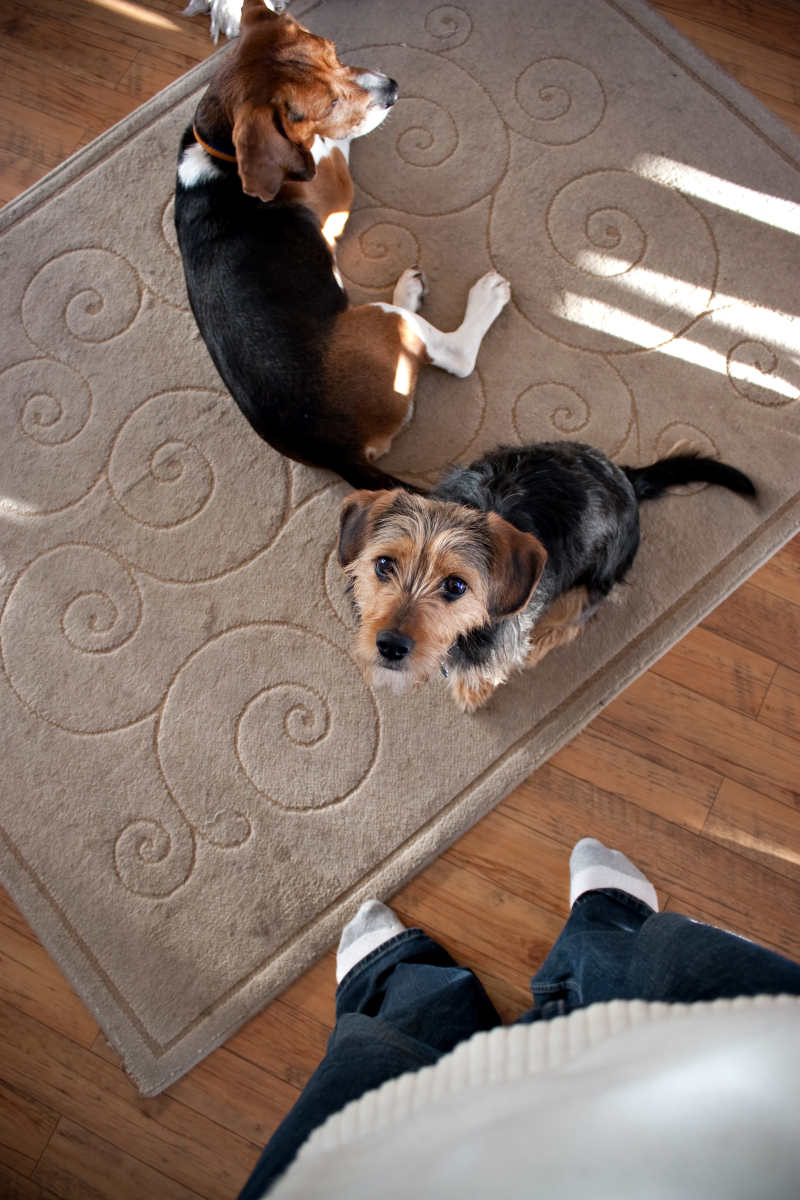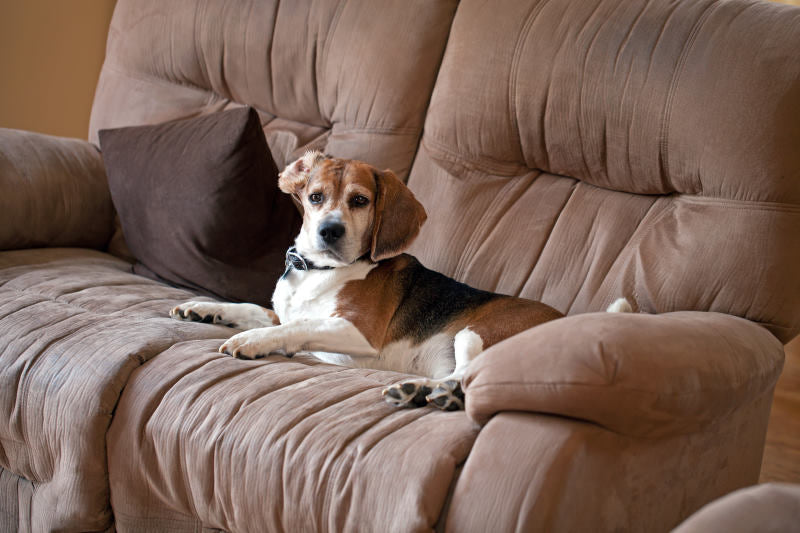Pet owners are becoming increasingly concerned about their dogs’ behavior when cooped up for long periods. In dogs, separation anxiety is one of the most common forms of anxiety, especially in breeds commonly used for work and prefer to be close to their pack. A dog’s vulnerability to abandonment anxiety is heightened if they have experienced trauma or were previously abandoned.
You will learn everything you need to know about anxiety in dogs, including how it manifests and what you can do to alleviate the symptoms.
What is causing dogs to be anxious?
A change in routine, environment, or activity may seem to come out of nowhere and cause anxiety at other times.
This is especially important to keep in mind now that areas have reopened following the COVID-19 shutdowns, and your pets have gotten used to spending more time with you.
One of the most common types of anxiety in dogs is separation anxiety, which can be triggered by a sudden change in routine when returning to work.
On the other hand, dogs can also suffer from different types of anxiety.
Anxiety in dogs can manifest itself in a variety of ways, including:
When your dog is separated from you or other regular caretakers, they may suffer from separation anxiety, whether from moving to a new location or even from a new schedule. What most people think of when they hear the word “anxiety” about their dogs
Generalized anxiety can appear out of the blue, with no known trigger or cause, even in well-trained dogs.
People who suffer from environmental anxiety often have anxiety about leaving the house or going to certain places, like a veterinarian’s office. Noisy stimuli like sirens, fireworks, or thunder can also elicit fear in people who are sensitive to the environment.
The fear of social situations, such as being around other people or dogs, is known as “social anxiety.” There are many reasons for this, including past rescue trauma or a lack of social interaction.
It is possible to suffer from a variety of different types of anxiety at the same time and in combination with one another.
How do you know if your dog is suffering from anxiety? A person’s nonverbal cues are frequently more telling than their verbal ones.
The signs of anxiety can vary from dog to dog, depending on the type and severity of the condition, but observing your dog’s body language is the most straightforward way to determine whether or not your dog is suffering from anxiety.
This can include subtle signs, such as overreactions or unusual reactions to changes in location, people, or social situations. Dogs may bark or be overly reactive, but it can also be as simple as a new place’s lack of interest in food.
These are some other signs of stress manifested through the body’s language:
- Panting
- Restlessness or agitation
- Barking
- Whining
- tail tucked in, and ears tucked back.
- Involuntary tremors or shaking
- Drooling
- It is being unable or unwilling to eat on a regular schedule or at all.
- Aggression
- Inappropriate urination or defecation in the house or where it is not permitted
- Stupidity and selfishness (tearing up furniture, carpets, etc.)
- A lot of yelping
- Involuntary and habitual behavior
- In constant search of a way out (fight or flight),
- You could be hiding in a crate, corner, or even behind some furniture.
- Enclosure-defeating methods of escape
Keep an eye out for them to see if they recur or if they are just a one-time occurrence. A bored or under-exercised pet may only act out once in a while, such as by chewing on a piece of furniture or a stuffed animal.
Webcam monitoring is a great way to watch your dog if they’re acting out frequently, but you’re not sure if they’re showing other signs of anxiety.
What you can do right now to help your dog de-stress
Pet anxiety can be treated in several ways. Here are a few ideas.
The most important thing to know about anxiety in dogs, particularly recurring anxiety, is that there is no “magic bullet.” The techniques you’ll find in the following sections will help you calm your dog when he’s anxious, and we’ll discuss ways to reduce anxiety in the long term.
First and foremost, if you see a consistent, high-level display of these symptoms, you should consult with your veterinarian to rule out possible medical issues. Due to their illness, some dogs display signs of anxiety.
There are a few treatment options for dogs who have been diagnosed with anxiety, depending on the level of anxiety your dog is dealing with.
Treats or Toys
Licking is an enjoyable pastime for dogs, so providing them with something healthy to lick keeps their minds occupied and helps them relax. Canned pumpkin or low-fat cream cheese stuffed into a toy, for example, to avoid putting on weight, include those calories in your dog’s daily calorie intake. Only 10% of your dog’s daily calorie intake should come from treats.
Use trained behaviors to disarm them.
Try using behavior commands like sit, paw, lie down, and the like to engage an anxious dog. Distracting people from their anxieties and focusing on work is a great strategy.
You can also play games like hiding a treat and encouraging your dog to find it to train your dog’s nose. As a result, they can switch their attention to something more exciting.
Spaces that are safe to be in
Your dog needs a place to unwind, so make it happen! Use the same bed, blanket, or mat every time you visit a new home, and bring it with you. Make it a habit to reward your dog for relaxing behaviors on the mat, even when they aren’t under any stress. When you have to leave the house, go to the vet, or have an anxiety-inducing experience, they have a comfortable place to rest their heads while you’re gone from home.
There are a lot of dogs who benefit from crate training as well. In some cases, dogs find their crates to be a haven where they can retreat. However, if you’ve never used a crate before, don’t use it when your dog is already nervous. As with any other safe space, crates should be associated with comfort and possibly treats rather than being used to punish or confine animals.
MASSAGES/TOUCH
All your dog needs to unwind is a little love and care from time to time. It’s possible to relieve your dog’s stress by massaging his ears and forehead.
Stimulation of the audio system:
A simple way to help your pet get some peace during the day is to play music. On Spotify’s dedicated dog podcast, you can listen to more than 14 hours of podcasts just for your dog.
Additionally, they have a tool that generates a playlist for your pet’s personality.
How to deal with long-term stress at home:
Anxiety in pets can be reduced at home, even if mild or moderate, with a few simple techniques. If these steps don’t help, or if your dog is suffering from more severe anxiety, contact a local trainer who specializes in anxiety.
DESENSITIZATION:
Desensitizing dogs to the “triggers” that cause anxiety is one way to help them feel better.
What am I (or is your pet) doing that’s causing this anxiety? Ask yourself these questions. Deprive yourself of the excitement and start doing these activities more mundane and unwinding.
If your pet becomes anxious whenever you leave the house, you should try to figure out what activities precede your departure. Picking up your keys, putting on your shoes, pouring a cup of coffee on the go, and so on. When you’re at home, do these activities to desensitize your dog to the triggers, such as picking up your keys and walking around. This tells your dog that the keys (the motivation) aren’t such a big deal.
You can also go for a walk without your dog to help them adjust that they won’t always be with you. To prepare your dog for the reality of your absence, gradually increase the amount of time you spend away from them so that they become accustomed to your absence.
Using this technique, people afraid of loud noises or fireworks will find relief. To begin with, it is best to start with quieter sounds and gradually increase the volume until your dog understands that these aren’t so frightening!
Counter temperatures are as follows:
It is possible to teach your dog to see stress or triggers as a positive experience (or, at the very least, a learning opportunity).
Instead of a negative, it’s a good thing. Instead of anticipating the trigger, treat them to something pleasant when it occurs. Think of ways to help your dog cope with stressful situations, such as rewarding him with a treat each time a loud noise occurs (or gradually desensitizing him to louder ones).
Have a food puzzle toy if your child suffers from separation anxiety. This will keep their minds busy while you’re away.
Supplements and other “STRESS RELIEF” products include the following:
You and your pet’s veterinarian can discuss whether or not prescription anxiety medication is appropriate for your pet. Before giving your pet any medications or supplements, discuss your plans with your vet.
There is no shortage of over-the-counter “stress relief” medications for those who want to avoid prescription medications. You may or may not like these supplements and products. This product could provide some relief for some pets, but it is not always tested or regulated to guarantee efficacy and consistency. If you choose to use veterinary-recommended products or supplements, keep in mind that they are not a substitute for training.
A sophisticated education
Training from an expert can be highly beneficial for helping dogs overcome their anxiety. Some dog trainers specialize in helping dogs overcome anxiety and stress, such as board-certified veterinary behaviorists or certified applied animal behaviorists (CAAB or ACAAB) (Dip ACVB).
There is no quick fix for anxiety in dogs. One training or product won’t turn it on or off for you overnight. A long-term approach is needed to help your dog overcome its difficulties. You can help your pet overcome their anxiety and live an entire and happy life by training them consistently and dedicating yourself to their well-being.
Most importantly, don’t lose your cool with your dog if they’re acting up. What happened to them? In reality, your pet is simply expressing their fear and anxiety in this way.




Add comment